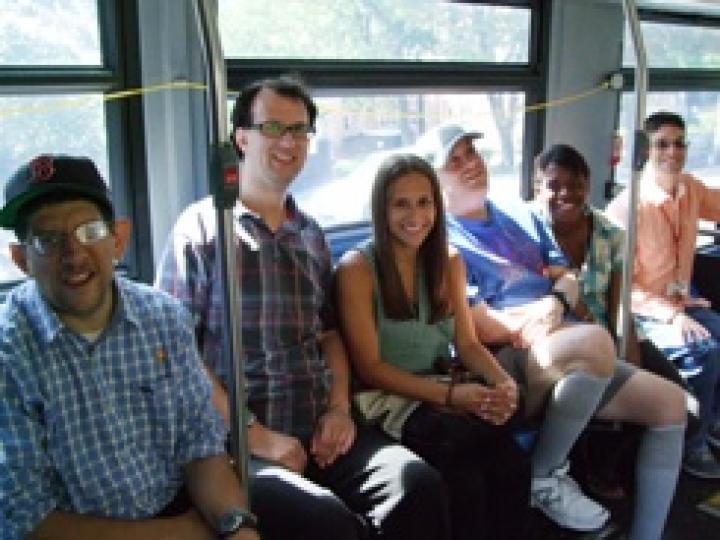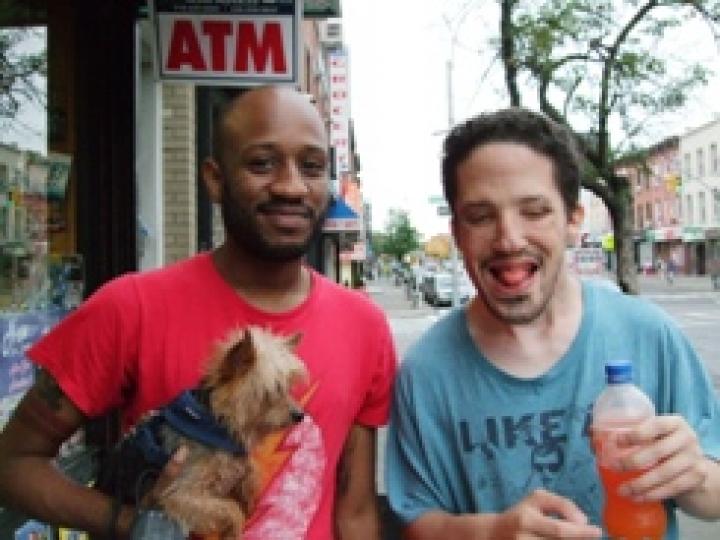Share
Friday is in the air at YAI’s Bayside Day Habilitation program. Lauren Jacobs, Community Training Specialist, sits with Mark Komito, Michael Eppich, Ben Masella, Pino Cusumano and Erica Vega, with whom she will soon travel to the Clearview Senior Center to serve lunch.
But first the group must decide who will take on which tasks. Each individual shares his or her preference, and together they negotiate roles. On a white board, Lauren writes a name next to each task and reminds the group that Mark, who has the most experience at the Center, will be the go-to person if anyone has any questions or concerns on the job. Mark nods and smiles modestly.

After reviewing community safety, the group heads outside to catch the Q13 bus. A short ride and one transfer later, the group arrives at Clearview.
"Hey everybody!" smiles Curtis Belgrave, the cook at Clearview who oversees the kitchen, as the group enters. "Happy Friday!"
As Lauren distributes hair nets and helps tie aprons, Mark bustles around the kitchen.
"Mark is Curtis’s right-hand man," Lauren says.
"Mark's the boss and he takes charge of everything," Curtis agrees. "One thing I can say is that everyone in this group knows what they’re doing."
While the kitchen staff prepare entrees, Erica, Pino, Michael and Ben set up drinks, cutlery, bananas and rolls to distribute to guests, who begin arriving. As the individuals serve the seniors, exchanging greetings, Lauren looks on.
According to Lauren, learning about people’s interests and providing them with choices to pursue these interests in different volunteer settings has made a big difference in helping individuals build skills that can help them achieve their goals.
"Ben loves the TV show 'Hell’s Kitchen.' So I really wanted him to have the opportunity to come here and be able to work in a kitchen, even though he sometimes needs extra support. This is a very independent group so it was just a matter of making sure we could balance support needs, and it has worked out really well."
Thinking outside the box is something that comes naturally to Lauren, who graduated from the University of Hartford with a B.A. in psychology before coming to YAI. When she took a training in Personal Outcome Measures (POMs), she immediately connected to the philosophy and her fellow trainees who shared it.
"Everything about it appealed to me," Lauren said. “The emphasis on listening to the people we support and digging deeper to find out what’s really important to them, the focus on changing the way we go about our work to promote living, loving, working, and learning. We should be adjusting the program to fit the individuals' needs, rather than focusing on changing individuals to fit the program. Everyone has different passions, and asking and trying to find a way to fulfill those dreams really stuck out because that’s what we are here to do."
POMs has inspired Lauren, who serves on YAI’s Day Services/Employment POMs Committee, and others at Bayside to launch new initiatives to recognize, work towards and celebrate individual goals and accomplishments.
From providing opportunities for individuals like Mark to develop leadership skills at volunteer sites, to creating a board displaying birthdays and anniversaries, to starting a model mentor program for experienced participants to assist new ones—and a binder full of other ideas in various stages of implementation—efforts have focused on "really giving empowerment back to the individuals," as Lauren put it, adding, "They've been here 15 years in some cases. I've been here three."
After cleaning up at Clearview, the group heads back to YAI to review the work day and enjoy their own lunch.
"My goal," Lauren says, as the group chatters, "is for each individual to find his or her dream and for us to learn how we can help them achieve it."
Building Skills in Brooklyn

It's 4 p.m. and Yair glides through the front door into YAI's 22nd Street Residence in Brooklyn. He says that he is a little tired after day program. His energy lifts when he is greeted by Ali, a vivacious Yorkie who belongs to Chris Humphrey, Assistant Behavior Intervention Specialist at the program.
"Hi Ali!" Yair says, crouching down to pat the eager dog. "Ready for your bath?"
"Oh he's ready," Chris replies. "He's been looking forward to it."
Chris has been bringing Ali to work with him periodically ever since Yair mentioned that he wanted to get a dog so that Yair could learn about the work involved in having a pet.
"We talked about the responsibility of feeding, walking, bathing and taking care of a dog," Chris said. "But actually doing it is the best way to learn and decide if this is something he really wants. I wanted him to have a chance to find out."
When Chris later participated in a POMs training, he discovered that his response to Yair was an example of "the three E's" – providing individuals with the education, experience and exposure to empower them to make informed decisions about their lives.
Chris, who was born and raised in Brooklyn and who earned a B.A. in psychology from Penn State, says that POMs provided him with a framework for his beliefs and strategies in supporting people with disabilities, and techniques to really listen. This was especially important to Chris, who works with several individuals who don't use words to communicate.
Since the training, Chris says that he and his colleague, Chris Valladares, a Direct Service Professional who also participated, have worked with the rest of the staff to implement elements of POMs into the daily life of the residence.
"One example is our weekend activities," said Chris. "Every week the residents decide what they want to do. Before, if one person said they wanted to go to the movies, that's what everyone would do. I realized that they might not know about other activities they could choose. So we started showing them different ideas, pictures of things we do, different places to go, and we learned that they were interested in and capable of things we never imagined."
One Friday night several residents said that they wanted to go swimming. The staff found a nearby pool and reviewed safety protocol.
"We knew they’d be safe, but we really weren’t sure what would happen when we got there, how much they’d actually swim," Chris said. "Before we knew it, people were swimming around, doing the backstroke. One individual said that he hadn't swam since his childhood and it brought back good memories."
According to Chris, making small changes inspired by POMs has had a big impact on enhancing residents' quality of life.
"The more we are asking and involving individuals in decision-making, they more vocal they have been about what they want to do and what they like. Now they feel they have more control and their frustrations have decreased a lot."
For now, Yair has decided that the full time responsibility of having a pet is not for him. But he loves taking care of Ali when he visits. As he and Chris head upstairs to prepare Ali’s bath, they review the items needed, an exercise that Chris says has helped to reinforce Yair’s skills in showering independently. Shampoo, tub, towel. Only one thing was missing.
"Ali!" Chris calls. Within seconds, the dog appears.
While Yair gently shampoos and then towel-dries Ali, Chris says that POMs has helped him to see the people he works with in a different light.
"The individuals are way more than their disabilities," he said. "POMs opens the door to do things differently, starting with asking the questions that all human beings deserve to be asked," he said. "It can be easy to get distracted by behaviors, which can put up barriers. But we must ask the questions that will enable individuals to do new things and get to where they want to be. The questions break down the barriers by letting us get to know the individuals we work with in the way that we all want people to get to know us. That’s why we’re here at the end of the day."
